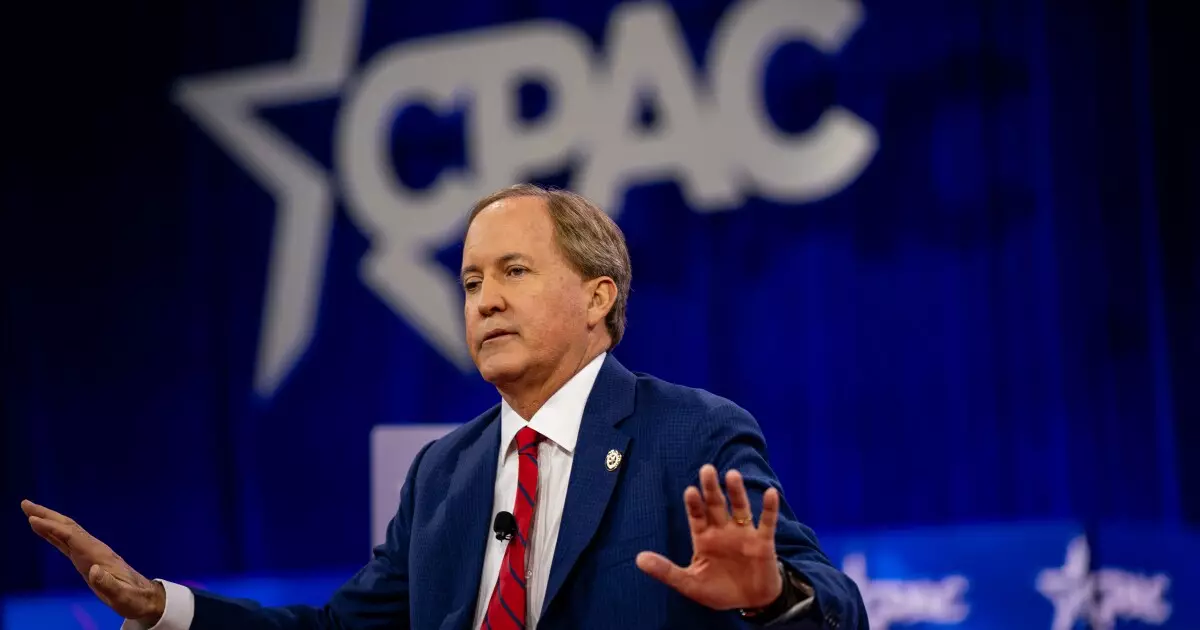The actions of financial institutions in relation to environmental responsibility have become a hotbed of political and economic debate, particularly in conservative states such as Texas. Recently, Texas Attorney General Ken Paxton publicly endorsed the decision by major banks including Bank of America, Morgan Stanley, and JP Morgan to withdraw from the Net-Zero Banking Alliance (NZBA). The NZBA emphasizes a transition towards net-zero greenhouse gas emissions by the year 2050. Paxton’s remarks and subsequent investigations into these banks highlight the growing tension between fossil fuel interests and environmental initiatives within the financial sector.
At the core of Paxton’s criticism lies a 2021 Texas law that prohibits state contracts exceeding $100,000 with companies deemed to be “boycotting” the fossil fuel industry. This legislative framework reflects an aggressive stance against environmental regulations and non-compliance with fossil-fuel-friendly policies. The term “energy boycotters” is particularly charged, invoking potential fears of repercussions for any institution that adopts a more sustainable business model. Paxton’s office initiated reviews of several banks, including not only the departing members of the NZBA but also Wells Fargo, Barclays, and RBC Capital Markets, ostensibly to ensure compliance with this law.
Paxton’s assertion that financial institutions’ involvement in eco-friendly initiatives could lead to bans on underwriting municipal bonds further accentuates the urgency felt by those aligned with fossil fuel interests. His remarks imply a defensive posture aimed at reinforcing state support for traditional energy sectors amid rising global pressure to adopt higher environmental standards.
The withdrawal from the NZBA by major finance players like JP Morgan and Bank of America raises questions about the long-term commitments of these entities to sustainable practices. In their statements regarding the withdrawal, both banks aimed to reassure stakeholders that they remain committed to reducing emissions without the constraints imposed by the NZBA. Nonetheless, this dual approach undermines the credibility of genuine efforts toward sustainability, sparking skepticism among environmentalists and advocates of climate change mitigation.
As various banks navigate these waters, they are often at the mercy of local regulatory attitudes. In this case, with Paxton indicating ongoing scrutiny of bank activities and their affiliations with environmental groups, banks are presented with a precarious balancing act: how to manage their reputations in the eyes of consumers and regulators who may have conflicting priorities.
The implications of these decisions extend beyond the immediate financial landscape; they also contribute to the broader discourse on climate policy in the United States. Texas’s legal framework fostering support for fossil fuel industries could serve as a model for other states with similar political leanings. The chilling effect this has on financial institutions’ willingness to engage with sustainable practices raises broader questions about the viability of national climate initiatives when met with localized legal opposition.
Additionally, the ongoing legal challenges to the constitutionality of the 2021 fossil fuel boycott law reveals an underlying tension between state policy and federal regulatory directives aimed at addressing climate change. The lawsuit filed against Paxton by a coalition of business groups may reflect a broader dissatisfaction with the impediments to sustainable investment practices stemming from state-level laws favoring fossil fuels.
The Path Forward
Moving forward, financial institutions must contend with the risk of alienating environmentally-conscious stakeholders while navigating state legislative environments that seem increasingly hostile to sustainable practices. As banks reassess their commitments to sustainability following Paxton’s announcements, one must consider how the climate initiative landscape will evolve.
With complexities in contracts, compliance, and public perception at play, the pursuit of net-zero emissions might already be giving way to a climate of caution—effectively sending a signal that prioritizing fossil fuel economics could hinder genuine progress in greening the finance sector. Ultimately, as the legal challenges unfold and financial players reassess their involvement, the path toward a more sustainable and equitable financial system remains fraught with challenges influenced by both regulatory frameworks and market expectations.

